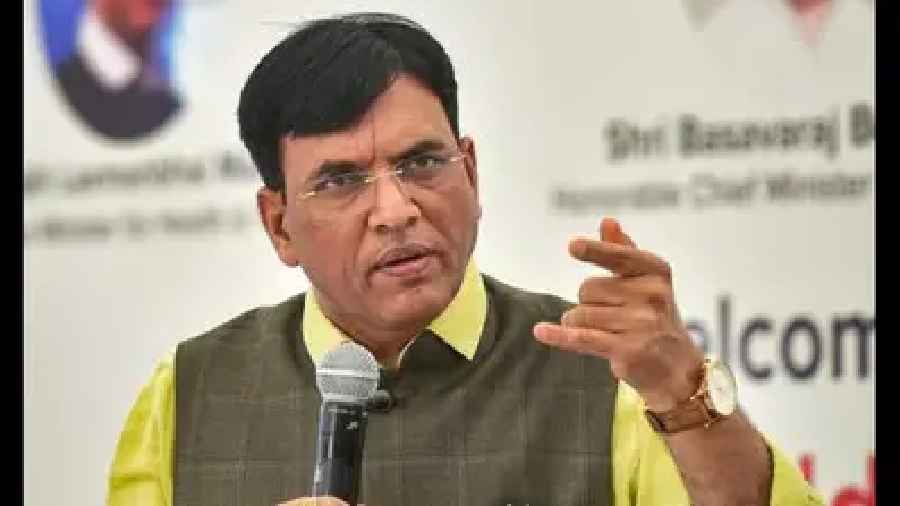The COVID-19 pandemic has been a catalyst of growth and has accelerated the adoption of digital tools, Union Health Minister Mansukh Mandaviya said on Friday, while stressing that under India's presidency, the proposed G20 global initiative on digital health will prioritise bridging the digital divide.
The initiative will bring together scientific expertise, collective best practices, develop digital public health goods, support implementation and institutionalise the use of digital tools in health service delivery with a specific focus on lower middle-income countries (LMICs), Mandaviya said, addressing the health ministers' session at the Voice of Global South Summit 2023.
"The COVID-19 pandemic has taught us that we live in an interdependent world and we are all vulnerable when it comes to managing any public health emergency," the minister said.
The pandemic has highlighted the existing challenges in health systems and the need for a 360-degree transformation in healthcare delivery, pathway and infrastructure, he added.
It is the need of the hour to focus on long-term measures to build stronger, more resilient health systems that can prevent, prepare for and respond to future health-related challenges, while maintaining essential health services, Mandaviya said.
India assumed the presidency of the influential G20 (Group of 20) in December.
"It will be our effort to take the voice of the global south to G20 and other international forums as partners in our development journey," Mandaviya said.
India has prioritised to focus on converging ongoing efforts at the global level, mapping health resources and connecting those to the most-deserving areas so that health equity can be assured at the global level and particularly, to the global south, the minister added.
The pandemic has highlighted the importance of capacity building of the existing healthcare workforce. This will enable them to provide quality and affordable healthcare at the local level to cater to the underserved communities in the global south, he said.
The consistent investments made by India in the primary healthcare workforce paid dividends during the Covid vaccination campaign, Mandaviya pointed out.
"I am happy to highlight that so far, we have administered more than 2.2 billion (220 crore) vaccine doses with a 90-per cent second dose coverage of the 12-year-plus population and 220 million (22 crore) precautionary doses," he said.
India's experience has reinforced the fact that capacity building of healthcare workers, coupled with harnessing digital technology, is the way forward, the minister noted.
It is in this context that India has been supporting various countries in terms of building the capacity of their healthcare workers through tailor-made training programmes, he said.
India organised online training programmes on Covid testing, clinical practices, case management, vaccine development and delivery with more than 1,000 participants from Asian and African countries.
"With all its challenges, the ongoing Covid pandemic also has been a catalyst for growth and has accelerated the adoption of digital tools.
"In the spirit of seva, India has offered CoWIN, the indigenously-developed vaccine management platform, as a digital public health good to the world," Mandaviya said, adding that at the CoWIN global enclave held on July 5, 2021 with more than 140 participant countries, India reached out to offer the platform as an open source software, free of cost, to any interested country.
India has also offered CoWIN as a digital public health good to the World Health Organization (WHO), the minister said.
"Under India's presidency, the proposed G20 global initiative on digital health will prioritise the digital agenda and contribute towards bridging the digital divide," he said.
Under the leadership of Prime Minister Narendra Modi, there has also been a paradigm shift in India in terms of promoting holistic health as a way forward, Mandaviya said.
He said 1.5 lakh health and wellness centres have been established across the country to provide preventive, promotive and curative, rehabilitative and palliative care, covering primary and secondary health services.
"Further, India's civilisational ethos emphasises not only therapeutics but wellness as an approach to healthcare. Traditional medicines and yoga, including pranayama and meditation, are India's contribution to the world," the minister said.
Since 2015, the world has been observing the International Day of Yoga with a huge participation. For billions of people, traditional medicines are the first part of call to treat many diseases, Mandaviya said.
The Indian government, in a collaboration with the WHO, established the WHO Global Centre for Traditional Medicine at Gujarat's Jamnagar on April 19, 2022 with the central aim to harness the potential of traditional medicines from across the world through modern science and technology to improve the health of people, Mandaviya said.
Focusing on four strategic areas -- evidence and learning, data and analytics, sustainability and equity and innovation and technology -- India would like to work with its partners in the global south to harness this potential, Mandaviya said. PTI PLB RC











